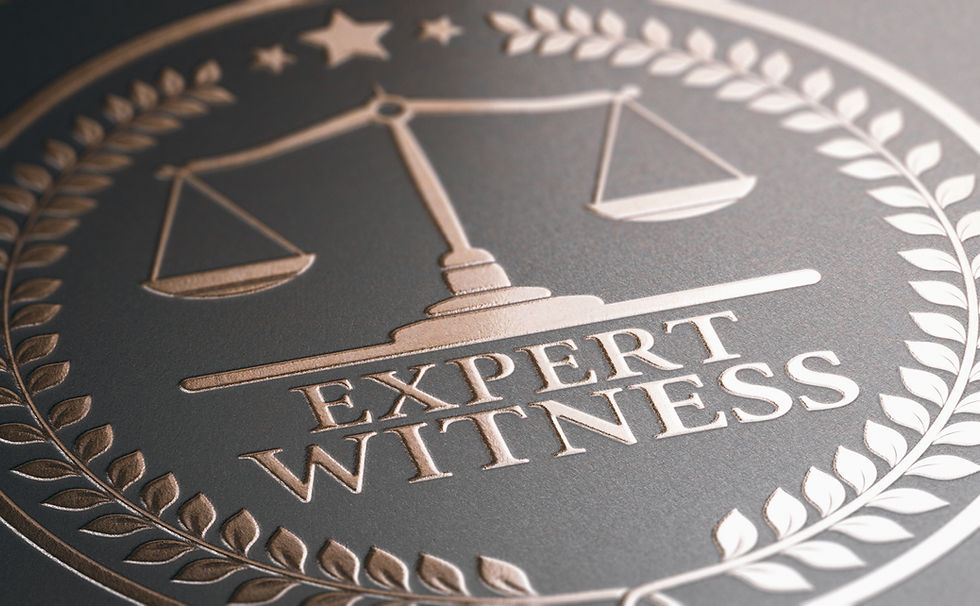Law Fact #1 – Expert Witness Testimony and the Law
- Danielle Marshall
- Feb 14, 2023
- 3 min read

In most incidents, court rules prohibit a witness from testifying to their own opinions or analysis. Witnesses must stick to facts; what they saw, heard, or experienced. However, these court rules change if the witness is certified as an expert. An expert witness can testify about matters pertaining to their field of expertise. This includes their own opinions and analysis formed with the reasoning and tools experts apply in that field. Because expert witness testimony strays into opinion and analysis the bar for qualifying someone as an expert witness is much higher than it is for any other type of witness. Understanding the laws that govern expert witness testimony can help experts perform their duty better.
Standards & Requirements for Expert Witness Testimony
Every state has its own court rules that govern expert witness testimony. However, quite a few states pattern their rules on Federal Rules of Civil Procedure (FRCP). Article VII of the FRCP lays the ground rules for opinion testimony which includes expert witness testimony.
While the Federal Rules of Civil Procedure provide a framework, the rules themselves can leave many questions unanswered. Various U.S. Supreme Court cases have clarified some matters, such as Daubert v Merrell-Dow Pharmaceuticals (1993).
Daubert Standard
The Daubert standard is the set of criteria used to determine the admissibility of expert witness testimony in Federal Court. The trial judge uses these criteria to determine whether an expert's testimony is reputable. The judge must assess whether the testimony is 1) based on scientifically valid reasoning and 2) whether it has been properly applied to the facts at issue. If the judge determines the expert's testimony does not meet the criteria their testimony may be excluded.
The Daubert standard established five factors for evaluating an expert's testimony
• Whether the theory or technique in question can be and has been tested
• Whether the theory or technique has been subjected to peer review and publication
• The theory or techniques known or potential error rate
• Whether standards exist controlling the theory or technique’s application or operation and if so, how those standards are maintained
• Whether the theory or technique has attracted widespread attention within a relevant scientific community
U.S. federal courts later incorporated the Daubert standard into Federal Rule of Evidence 702. Today, Daubert hearings are pre-trial hearings used to determine whether an expert's testimony meets this standard.
Legal Strategies Used to Prevent Experts from Testifying
Not all testimony given by an expert is sufficiently controversial to draw a challenge from opposing counsel. For example, washing hands to reduce the spread of germs is so well-known understood that it is unlikely to be questioned. One way opposing counsel may try to prevent an expert from testifying is filing a motion to exclude all or part of an expert's testimony.
Rules Governing Expert Witness Testimony
Federal rule of Evidence 703 states that an expert may state an opinion that is based “on facts or data in the case that the expert has been made aware of or personally observed.” Expert witness testimony must be based on facts or data which makes recording facts and data collected during the process important. Second, the opinion must be based on facts or data that the expert is aware of or has personally observed.
In most cases, testimony about information received second hand is considered hearsay and is not admissible in court. But there are exceptions to the hearsay rule. Under court rule FRE 703, however, an expert may testify to an opinion based on those facts, even if the facts themselves are not admissible.
Opinions Experts Should and Should Not Give
To survive a Daubert challenge and provide optimal assistance in a medicolegal case it is best if the expert’s opinions:
Are based on long-standing principles in their field
Focused on the facts and data
Clearly indicate where information is missing that might affect the outcome of their analysis
Focusing on these elements helps experts avoid expressing their opinions in unhelpful and inadmissible ways. For instance,”
Avoid speculating “what if” situations
Resist the temptation to apply new, untested, or emerging techniques
Remember that the work is about your professional opinion not your personal opinion
A well-formed expert opinion will help clarify key issues. It can also help the court understand the sometimes-intricate details of a case so a well-informed result can be found.




Comments